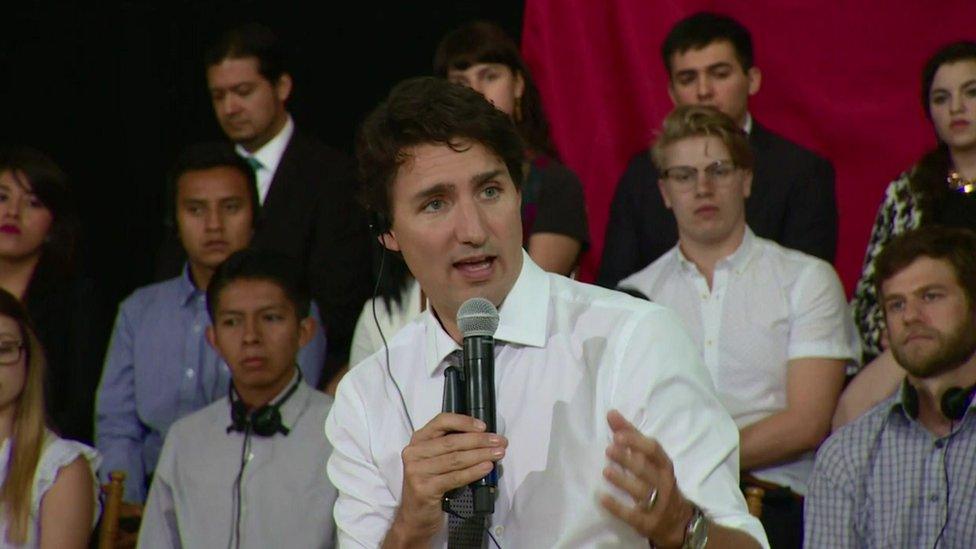Viewpoint: Why the US can afford to ignore Canada
- Published
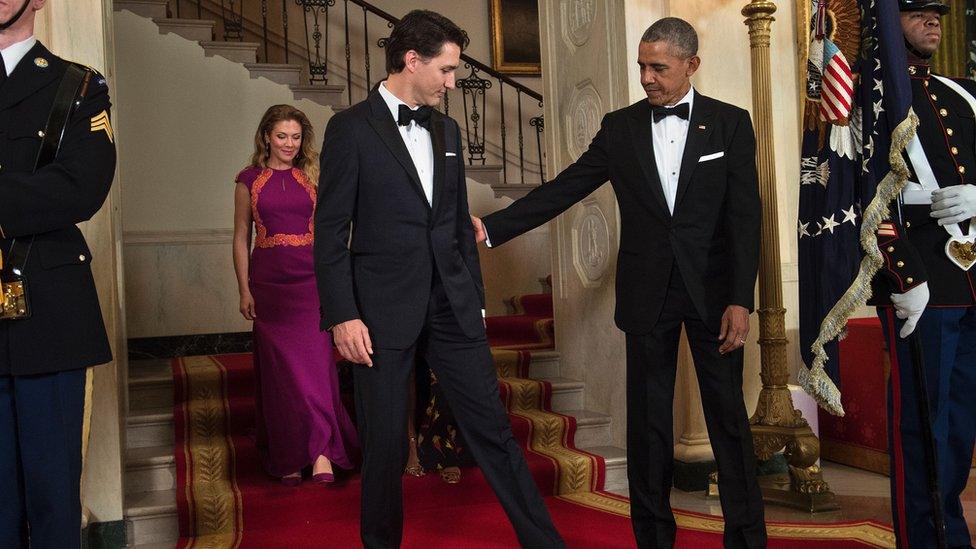
Despite being an important trade and defence partner, the US tends to ignore Canada. But that's paradoxically because the two get along so well, as Jordan Michael Smith writes.
US President Barack Obama's visit to Ottawa today comes six years after his last trip to Canada. Canadians could be forgiven for hoping that Mr Obama would pay more attention to America's northern neighbour than he has.
Mr Obama's first foreign excursion as president was to Canada, in February 2009, after all. And with his half-Kenyan ancestry and several childhood years spent living in Indonesia, he is the most cosmopolitan leader in American history.
Alas, Mr Obama devoted no more resources to Canada than previous presidents have.
"Canada's interests have hardly advanced during his time in office and, in some cases, have suffered," rued a columnist in the Toronto Sun. To be Canadian is to permanently lament the country's status - or lack of it - in American life.
One Canadian diplomat to the US entitled his memoirs, I'll Be With You in a Minute, Mr Ambassador. It was a refrain he heard often in Washington.
To say that Canada figures little in the mental America landscape would be charitable. With the exception of the cities in some states on the border - the top of New York, Michigan, and Washington state, in particular - Americans hardly think of Canada at all.
This can annoy Canadians to no end. Canada's only neighbour is the most powerful nation in the history of the world, a country that is permanently the subject of the world's spotlight.
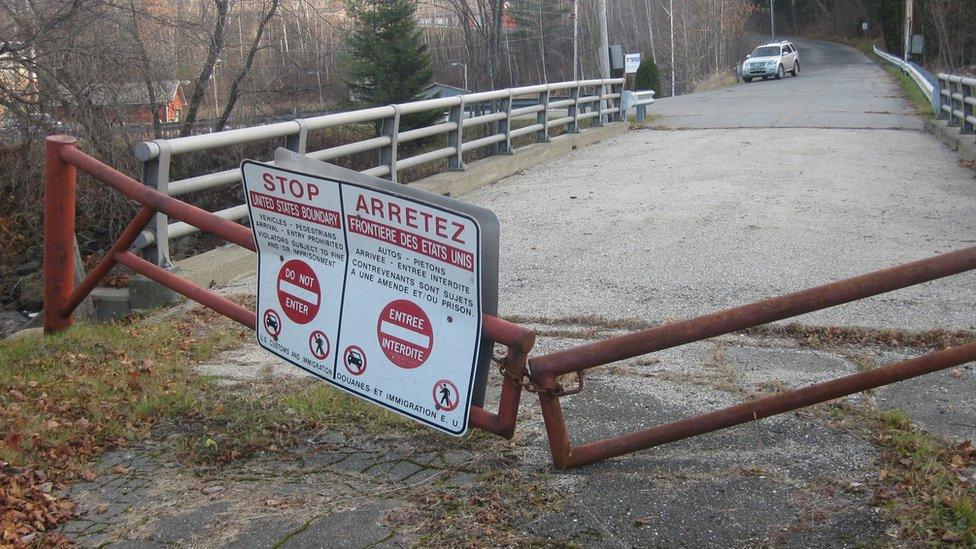
The US-Canada border in between Stanstead, Canada and Derby Line, Vermont
America has the globe's attention, being the agenda-setter for everything from sports to international security issues to popular music for much of the planet. And about Canada, it has ... not much to say.
Sometimes Canadian insecurity can reach absurd levels. Canadians were furious when, nine days after the 9/11 terrorist attacks, then-President George W Bush thanked many nations for their expressions of support but forgot to mention Canada.
A speechwriter in the White House said he was "inundated by requests - challenges really - from Canadian media to explain the speech and defend" the omission.

More from the BBC

Many Canadians thought the exclusion was a deliberate snub. But the reality, explained one of Bush's advisors, was that they just forgot all about Canada when working on the address.
In one sense, America's general obliviousness to Canada is bizarre. Canada is the US largest trading partner, larger than China and Mexico, two countries which receive far more concern in America.
Canada and America have the largest shared border in the world, and, remarkably, it is undefended.
Until post-9/11 security measures were enacted, a passport wasn't even required to travel between the two countries.
Under the North American Aerospace Defense Command (NORAD), the centrepiece of the US - Canada military relationship, US. and Canadian forces jointly conduct defence policies that, at least on paper, demonstrate a partnership that exists on an equal basis.
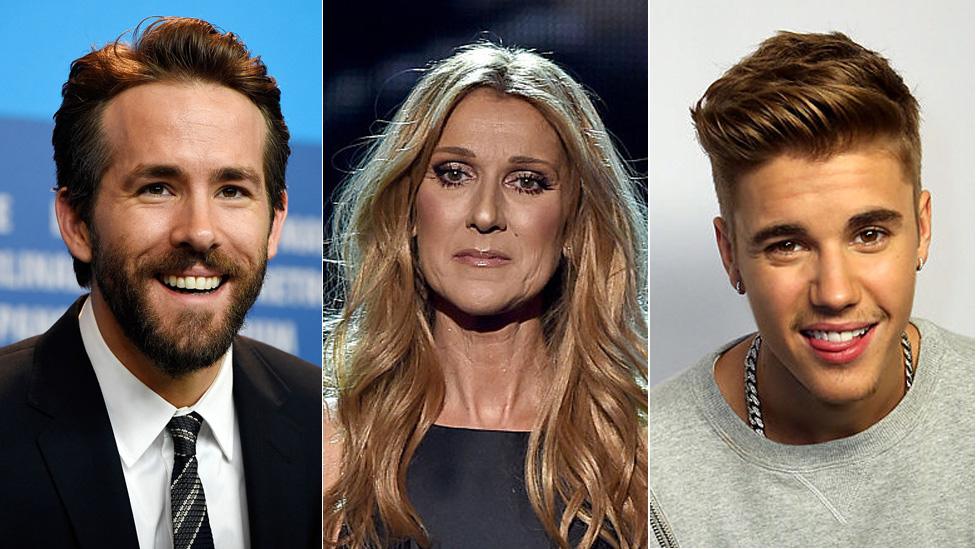
Big in the US, but Ryan Reynolds, Celine Dion and Justin Bieber moved to America to find fame
If all countries in the world enjoyed as warm relations as Canada and the United States possess, the United Nations could disband.
It is precisely that harmonious relationship, however, that explains America's inattention toward Canada. The US ignores its northern neighbour because it can afford to.
From the south, America panics about invading crime, terrorism, and drugs. Indeed, hyping the vastly inflated threat from Mexico has fuelled presumptive Republican nominee Donald Trump's political success.
But because Canada so obviously poses no threat even to such a fearful nation as America, it gets ignored.
American officials have exaggerated problems infiltrating from Canada. Every few years, an American border official will declare the Canadian border to be insecure and engendering terrorism and drugs.

The friendliness between the two nations does not extend to hockey
In March 2016, one customs official told CBS New York that he was seeing the smuggling of aliens, narcotics, and counterfeit currency. This followed a 2011 claim by the US border chief that the terrorist threat from Canada exceeded that from Mexico. And that hyperbole, in turn, came on the heels of 2009 alarms that drug trafficking from motorcycle gangs and Asian gangs were a serious problem.
These horror scenarios are repetitive of earlier panics - the New York Times reported in 1897 that American officials were worried Chinese men were being smuggled in from Canada, external, dressed as women.
Alas, such anxiety failed to capture the American public's attention in 1897, and similar warnings fail to do so now. Canada is simply too peaceful.
Obama and Trudeau traded jokes as the Canadian leader visited Washington
Not all of America's inattention to Canada can be blamed on pacific relations, of course. There is the simple matter of American insularity.
Americans travel far less to foreign countries than citizens of other nations, external, are more likely to speak only one language, external, and lack so much knowledge of the rest of the world that a government-appointed task force described US ignorance a genuine threat to national security, external.
Canadians are exposed to this unawareness in a unique way, being so dependent on America, and in such close proximity.
This imbalance is not going away anytime soon. And so neither is Canadian insecurity about being overlooked.
But as Mexico shows, sometimes the worst thing to happen to a country can be American attention.
Jordan Michael Smith, a Canadian writer living the United States, has written for the New York Times, Washington Post, and the Toronto Star.
- Published11 March 2016

- Published29 June 2016
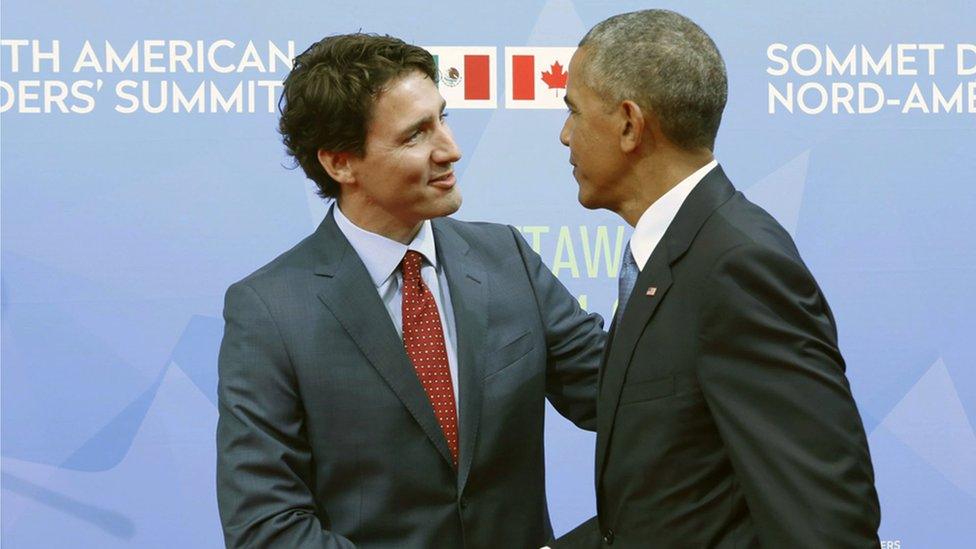
- Published29 June 2016
